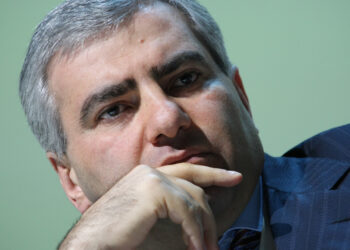MAKHACHKALA (Realist English). The world-famous poet Rasul Gamzatov supported the national liberation movement of the Armenians of Nagorno-Karabakh. Candidate of Historical Sciences, caucasiologistand linguist Timur Aitberov reminded about this in an interview with The Realist Information Agency.
“When the events in Nagorno-Karabakh began, the leadership of the Soviet Union decided to conduct a poll among the Members of the Supreme Soviet of the USSR, one of whom was Rasul Gamzatov, the world-famous poet and politician, a member of the Presidium of the Supreme Council. In Dagestan, everyone was tensely waiting for what Rasul would say — the patriots, offended by Azerbaijan’s attitude towards Dagestan, thought that Rasul was a politician who would support the general mood, that is, the anti-Karabakh and anti-Armenian line. However, Rasul supported the just cause of the Karabakh Armenians. A scandal broke out. Gamzatov’s books came from Azerbaijan in huge bundles.
This way, the Azerbaijanis tried to humiliate him and express their contempt. Moreover, they started to talk that the Armenian Diaspora had bribed Rasul with some kind of “diamonds”. And three years before these events, the following happened: Gamzatov, as a member of a Soviet party delegation, visited Iran. At the time, the “iron curtain” still reigned.
After visiting Iran, Rasul arrived in Baku, where the leadership of the Central Committee of the Communist Party of the Azerbaijan SSR [i.e. Soviet Socialist Republic] invited him to speak before its staff. Gamzatov speaks officiously. After his speech a series of questions comes. One of the workers of the Central Committee stands up and asks: “Rasul Gamzatovich, how do our Azerbaijanis feel in Iran?”.
Rasul answers him impromptu: “Just like our Avars in Azerbaijan.” Silence reigned… That was the end of the conversation with Rasul (smiles).
That is, Gamzatov’s position was long-standing and principled. There were no bribes or diamonds there. Rasul spoke publicly about what happened in Baku at a meeting with the intelligentsia of the Dagestan Academy of Sciences. There were more than 200 people in the hall at that time, including myself. The fact is that the study of the Avar language in Azerbaijan was banned during all Soviet times. In the era of “perestroika”, when there was a power struggle between Abdurakhman Vizirov* and the Popular Front in Baku, Denga Khalidov** and I went to the Azerbaijani SSR through the “Knowledge” society, where we posed the relevant question to the First Secretary of the district committee.
Currently, the authorities are pursuing a deliberate policy, which is designed to restore the ban on the study of the Avar language. We are talking about teaching 1 hour of the Avar language per week. By the way, in large Avar villages, the study of the native language is still prohibited. This refers, for example, to the village of Katekh, known since the XII century, where 7 thousand people now live. And also to the village of Tala, known since the XIV century. The Avar language is spoken there in the upper part of the village, and Azerbaijani is spoken in the lower part, where the migrants live. There are 2 thousand households in the Avar part, about 7 thousand people. And there the ban on the Avar language is in effect – as in many other villages where Azerbaijanis are present. I also draw your attention to the village of Gugam, which has been known since the XVII century (many Gugam people were in the nobility, some of them served in the bodyguard detail of the Russian Emperor — in the so-called Lezgin company, where only nobles were allowed).
Today, the Avar language is banned there. From 3% to 5% of Azerbaijanis live in Chardakh village. Under this pretext, the authorities banned the study of the Avar language. The latеуst ban was introduced in the village of Tsalban by the administration of the Belokan district — at the suggestion of the Ministry of Education of Azerbaijan, which was then headed by Jeyhun Bayramov (the current head of the Azerbaijani Foreign Ministry). And this was, based on the fact that only one Azerbaijani family lives there against the background of 300 Avar families,” Aitberov said in an interview with The Realist Information Agency.
*Soviet and Azerbaijani politician, Ambassador Extraordinary and Plenipotentiary, First Secretary of the Central Committee of the Communist Party of Azerbaijan.
**Public figure and scientist, political scientist and publicist.


















